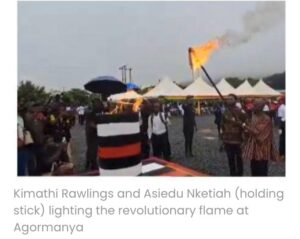46th Anniversary of June 4 Uprising Commemorated at Agormanya
 The 46th anniversary of the historic June 4 Uprising was solemnly commemorated at Agormanya in the Eastern Region of Ghana. The event brought together key figures of the National Democratic Congress (NDC) party supporters and members of the late Jerry John Rawlings’ family as they paid tribute to the legacy of a movement that reshaped Ghana’s political landscape.
The 46th anniversary of the historic June 4 Uprising was solemnly commemorated at Agormanya in the Eastern Region of Ghana. The event brought together key figures of the National Democratic Congress (NDC) party supporters and members of the late Jerry John Rawlings’ family as they paid tribute to the legacy of a movement that reshaped Ghana’s political landscape.
Leading the occasion was the National Chairman of the NDC, Mr. Johnson Asiedu Nketiah. He was joined by Dr. Zanetor Agyeman-Rawlings and Kimathi Agyeman-Rawlings the children of the late former president. Together they lit the revolutionary flame a powerful symbol of the spirit and ideals of the June 4 Uprising.
The June 4 Uprising, which occurred in 1979, was a military revolt driven by dissatisfaction within the ranks of the Ghana Armed Forces. The revolt was born out of frustration among lower-ranking soldiers who were unhappy with poor conditions in the military unpaid salaries, and widespread corruption by senior military officials.
The seeds of the uprising were sown on May 15, 1979, when Flight Lieutenant Jerry John Rawlings led a failed coup attempt. Following his arrest and death sentence Rawlings used his public trial as a platform to openly criticize the ruling Supreme Military Council (SMC II), led by General Fred Akuffo, for corruption and mismanagement.
On June 3, 1979, a group of junior officers broke Rawlings out of prison and presented him on national radio as the leader of their cause. They called on other military personnel to join the movement, which quickly gained momentum. The uprising resulted in the arrest and execution of several senior military officers, including three former heads of state.
Rawlings was subsequently declared the leader of the Armed Forces Revolutionary Council (AFRC), which governed the country for a brief period. Under his leadership, the AFRC implemented a “house-cleaning” exercise aimed at purging corruption and promoting accountability. In September 1979, Rawlings handed over power to the democratically elected president, Dr. Hilla Limann.
The June 4 Uprising remains a significant moment in Ghana’s history, symbolizing a stand against injustice and corruption. At the commemoration event in Agormanya, speakers emphasized the importance of preserving the values of truth, accountability, and patriotism that the uprising sought to instill in the nation’s governance.
As the revolutionary flame burned brightly it served as a reminder of the sacrifices made and the enduring impact of the June 4 Uprising on Ghana’s democratic journey.
